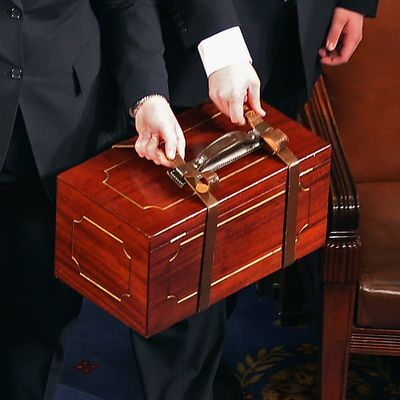
Earlier this year, former deputy White House chief of staff Roy Neel published a whimsical piece of political fiction about “faithless electors” changing a presidential election outcome. In The Electors, an incumbent Republican president loses the popular vote and falls three electors short in the Electoral College as well. His devilish chief of staff hatches a plot that succeeds in turning two “faithless electors” against the Democratic candidate they were pledged — but not required by law — to support. Because a third turncoat has a massive heart attack before her vote is technically cast, the election goes to the House and the incumbent prevails.
I have seen no particular evidence that the shadowy anti-Trump group trying to overturn the 2016 election with Electoral College defections was inspired by Neel’s book. But it is so wildly unrealistic and potentially counterproductive that by comparison The Electors is a work of gritty realism.
Technically, there are 21 states with 236 electoral votes (135 of them won by Trump) where laws do not require electors to vote for the popular-vote winner in that state. It is also theoretically possible that lawsuits being filed to strike down the coercive laws in the other 29 states (plus the District of Columbia) that sanction “faithless electors” could succeed, though there is no way they could succeed before the Electoral College casts its votes on December 19.
The bigger problem is that interest in denying Trump the presidency through a campus riot in the Electoral College is pretty much limited to Democrats.
The idea of Republican electors turning against Donald Trump found some traction back in the days when the mogul had nailed down the Republican presidential nomination over the violent objections of much of the GOP. It was the general-election equivalent of all the ultimately vain talk about a revolt of pledged Republican convention delegates determined to keep the demagogue away from the White House. Two Republican electors, one from Georgia and another from Texas, publicly expressed doubts they could bring themselves to cast votes for Trump (two Democratic electors expressed similar reluctance to vote for Hillary Clinton).
Two things changed radically to re-consign the “faithless elector” scenario to the pages of fiction. First, of course, Donald Trump did not win the Electoral College vote by the two or three votes that might have made a very small group of renegades potential coup-makers. It would now take a defection of 37 electors to undo the deed of November 8. Beyond that, the Republican Party is no longer in open or even covert revolt against Donald Trump. In a process that began the moment he won the presidential nomination, the GOP has dutifully lined up in support of its president-elect. An awful lot of the anti-Trump sentiment Republicans exhibited earlier this year involved fears that he would lose badly and drag down the Republican-controlled Congress with him. Those fears are obviously moot today. No Republicans in Washington or in the states will offer cover to a faithless elector, much less 37 of them. It is so not happening.
And so the plea made most conspicuously by Harvard law professor and political busybody Lawrence Lessig, that Republican electors rear up on their constitutional hind legs and award the presidency to Hillary Clinton as the popular vote winner, does not even pass the laugh test. Other members of the putsch cabal depart from Lessig by promoting a scenario whereby Trump-hating Republicans and Clinton-hating Democrats could join hands to elect somebody else entirely.
And even if the moon turned blue and somehow a coup did happen, there is a fail-safe opportunity for Republicans when Congress meets to count and certify the Electoral College vote. Congress could choose to disregard the actions of “faithless electors” (with support from GOP officials in the affected states) and certify Trump as the winner. And if (and we are deep into science fiction at this point) the Electoral College does not clearly award anyone with 270 electoral votes, then the House would name Donald Trump president anyway.
To be fair, some of the proponents of the deny-Trump-the-presidency scheme have on occasion admitted their fallback plan is to draw attention to how weird and screwed-up the Electoral College system is, in hopes of stimulating a popular backlash leading to a constitutional amendment getting rid of the whole system or perhaps a state-level push to neutralize electors in the future via the National Popular Vote initiative (whereby states agree to instruct electors to cast their ballots for the national popular-vote winner no matter what happens in individual states).
More likely this scheme will have a very different effect: It will validate the claims of Trump and his least responsible supporters that liberal elites are still trying to “rig” an election that has already happened. Roger Stone is already labeling the efforts to stimulate an Electoral College revolt “the dying gasp of the established order.” An impossible plot to overturn an election conducted under long-established if nondemocratic rules, with Democrats (led by a professor from the Vatican of liberal elitism) as the only supporters, is a very bad idea for anyone now focused on ensuring that the Trump phenomenon is a brief if lamentable aberration in American history rather than a sudden lurch down the road to national perdition.






























